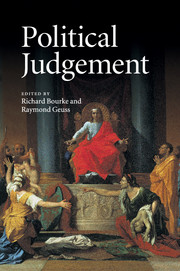Book contents
- Frontmatter
- Contents
- List of contributors
- Acknowledgements
- Introduction
- Part I The character of political judgement
- Part II Trust, judgement and consent
- Part III Rationality and judgement
- 7 Pericles' unreason
- 8 Accounting for human actions: individual agency and political judgement in Montaigne's Essais
- 9 Nehru's judgement
- Part IV Democracy and modern political judgement
- Bibliography of the works of John Dunn
- Index
9 - Nehru's judgement
from Part III - Rationality and judgement
Published online by Cambridge University Press: 26 December 2009
- Frontmatter
- Contents
- List of contributors
- Acknowledgements
- Introduction
- Part I The character of political judgement
- Part II Trust, judgement and consent
- Part III Rationality and judgement
- 7 Pericles' unreason
- 8 Accounting for human actions: individual agency and political judgement in Montaigne's Essais
- 9 Nehru's judgement
- Part IV Democracy and modern political judgement
- Bibliography of the works of John Dunn
- Index
Summary
On 15 August 1946, exactly one year before the partition of India and the creation of the independent states of India and Pakistan, Mohammed Ali Jinnah and Jawaharlal Nehru met in Bombay. They convened at Jinnah's Malabar Hill mansion, after many months of tortuous, three-cornered wrangling between the two men, their respective parties, the Muslim League and the Congress, and the British, concerning the future Indian state that would succeed British rule in the subcontinent. The arguments turned on how power should be distributed once the British had departed. Would it be concentrated in a unitary central state, its legitimacy based on the democracy of numbers; or would power be devolved or divided, in ways that recognised Indian Muslims as a nation entitled to their own political arrangements, and in a form that would ensure them – though numerically a minority – political parity with their Hindu compatriots? As they talked that evening on Malabar Hill, Nehru – as on past occasions – hoped to persuade Jinnah to participate in an interim government and in a proposed constituent assembly (whose task was to write a constitution for a united India), and to assure Jinnah that in this united independent Indian state that Nehru envisaged, the security and rights of all religious groups, including minorities, would be protected. Nehru also reiterated to Jinnah that the Congress proposed to nominate one Muslim amongst its designated cohort in the interim government – a move designed to affirm Congress's claim to represent all Indians, Muslims included.
- Type
- Chapter
- Information
- Political JudgementEssays for John Dunn, pp. 254 - 278Publisher: Cambridge University PressPrint publication year: 2009
- 4
- Cited by



